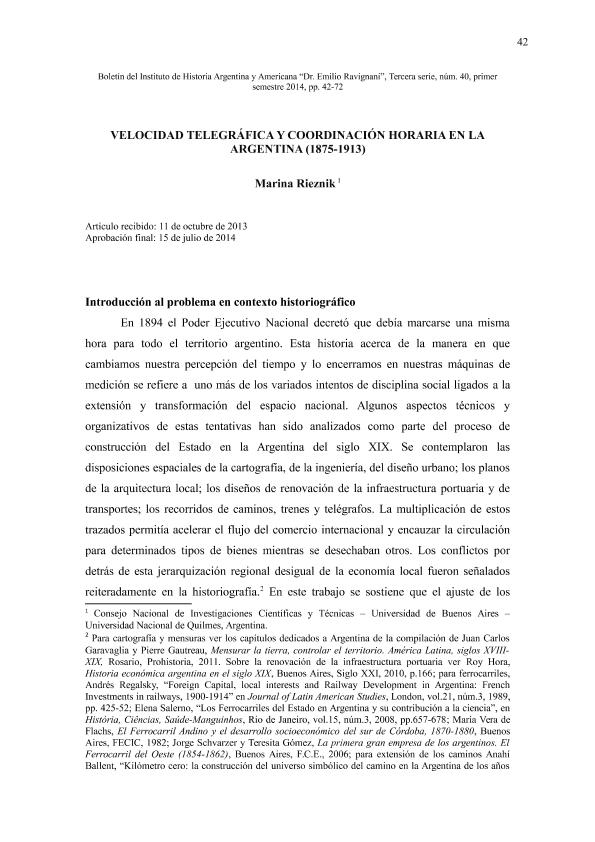Artículo
En 1894 el Poder Ejecutivo Nacional decretó que debía marcarse una misma hora para todo el territorio argentino. Cuando se decretaba esta unificación, los paladines de la disposición alegaban que se necesitaba cronometrar el territorio porque la sociedad debía organizarse en función de las velocidades de las nuevas tecnologías del telégrafo y del ferrocarril. Este artículo contrastará las dificultades materiales en la implementación de la telegrafía contra los discursos sobre el cambio brusco que supuestamente implicaba, poniendo en tela de juicio la urgencia en la coordinación horaria del territorio. Serán analizados informes del ejército sobre la telegrafía de guerra; artículos de una publicación aparecida desde 1912 llamada Revista Telegráfica; notas de la prensa diaria; debates parlamentarios y otras fuentes. In 1894, the Argentinean government issued a decree ordering to schedule a unified hour for the entire country. While this action was being put into effect, the supporters of the unification argued that to coordinate the time of the whole territory was needed to match social demands, and to organize the improvements brought on by some new technologies: telegraphs and railways. This article contrasts material difficulties found while implementing the telegraph, and the dominant speech, which praised the sudden changes that the telegraph supposedly implied by itself. It also put to question the urgency of time coordination for the whole country. In order to try it, we analyze reports from the army related to the use of the telegraph in war times; articles from a specialized publication, the Revista Telegráfica, which appeared in 1912; news articles; parliamentary debates, and several other sources.
Velocidad telegráfica y coordinación horaria en la Argentina (1875-1913)
Fecha de publicación:
07/2014
Editorial:
Instituto de Historia Argentina y Americana Doctor Emilio Ravignani
Revista:
Boletín del Instituto de Historia Argentina y Americana Dr. Emilio Ravignani
ISSN:
0524-9767
Idioma:
Español
Tipo de recurso:
Artículo publicado
Clasificación temática:
Resumen
Palabras clave:
Estado
,
Territorio
,
Horario
,
Telégrafo
,
Ferrocarril
Archivos asociados
Licencia
Identificadores
Colecciones
Articulos(SEDE CENTRAL)
Articulos de SEDE CENTRAL
Articulos de SEDE CENTRAL
Citación
Rieznik, Marina Andrea; Velocidad telegráfica y coordinación horaria en la Argentina (1875-1913); Instituto de Historia Argentina y Americana Doctor Emilio Ravignani; Boletín del Instituto de Historia Argentina y Americana Dr. Emilio Ravignani; 40; 7-2014; 42-72
Compartir




